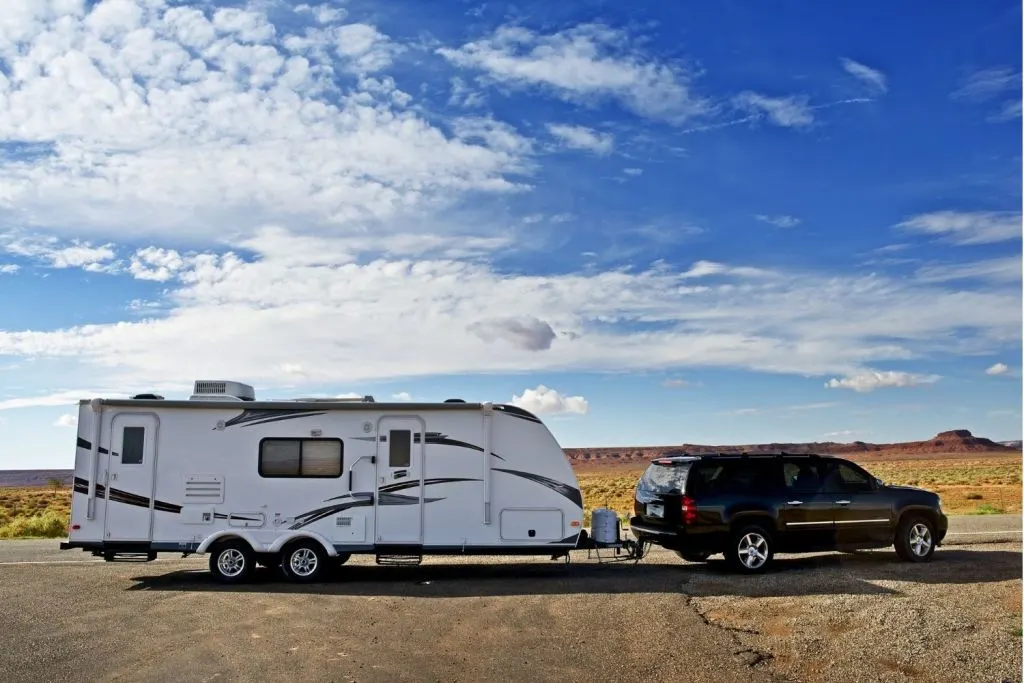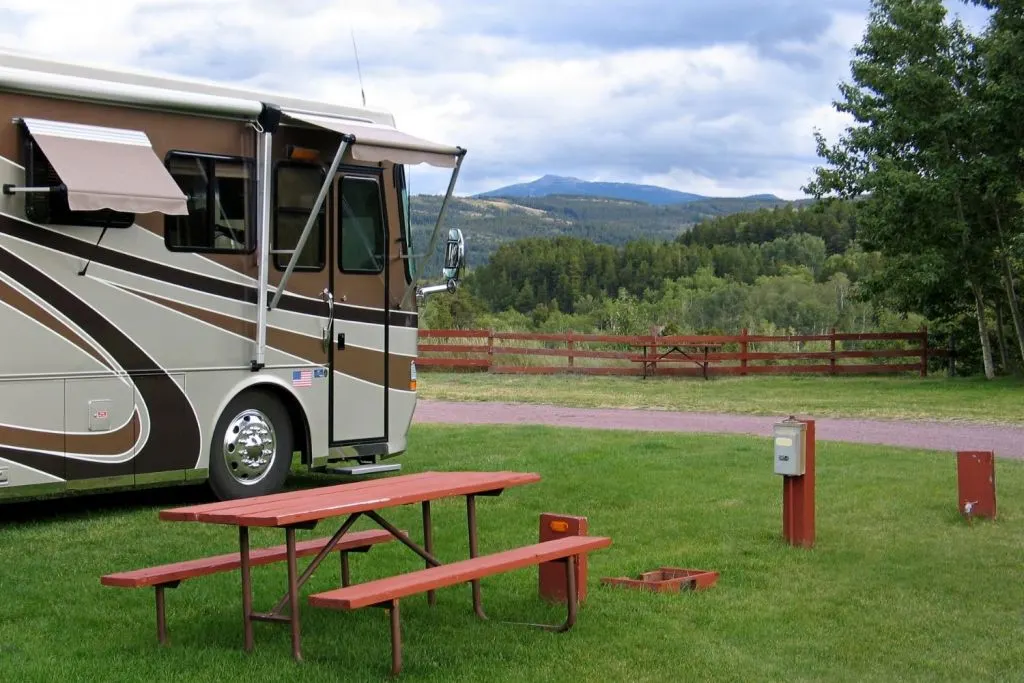What Is Your RV Dry Weight (And Why It Matters)
Weight is a word that can cause anyone to flinch. Especially if anyone is referring to being overweight.
And for healthy reasons, you don’t want to be overweight.
This holds true for your RV just as much as it does for your personal health. But when it comes to RV weight, there are many different types to pay attention to. RV dry weight is one of those terms that matter to the health and well-being of your rig.
Let’s dig into why RV dry weight matters.

What Is RV Dry Weight?
The dry weight is the weight of your RV without including the weight of your cargo, passengers, or fluids that are normally needed for your vehicle to function properly.
You can think of it as the weight before you or anyone has ever used the unit before. It is the weight as shipped from the manufacturer.
Nothing else is included in that weight. Not any fluids such as oil or gas or optional accessories.
Pro Tip: Here’s a guide to find a truck with the proper towing capacity.
Dry Weight vs GVWR
You now know that dry weight is nothing but the rig’s weight without any added fluids or cargo. Now, you need to know how that compares to GVWR.
GVWR stands for Gross Vehicle Weight Rating.
This is the maximum weight rating established by the chassis manufacturer. So, basically, the GVWR is what the base frame of your rig can hold.
GVW vs GVWR
Knowing the many different types of weight will help keep you, your passengers, and your cargo, including your rig, safe while on and off the road. Another type of weight when dealing with RVs is the GVW.
While the GVWR is simply a rating, the GVW is the rig’s maximum total weight when it’s fully loaded.
The GVW includes any passengers and any cargo. It also includes all the fluids it takes to operate a vehicle. In other words, the GVW is the weight your RV is when you’re driving down the road ready for a camping trip.
Keep in mind, this weight does not include anything you might be towing or are being towed by.
Why Knowing Your Dry Weight Matters
Since you cannot operate your RV at its dry weight, why does this even matter? Before we can answer that, you must understand that dry weight can actually be different numbers depending on each manufacturer.
Some manufacturers will include common optional equipment in the dry weight, along with RV batteries. And even though it states that dry weight does not include fluids, some manufacturers will include the weight of oils, coolants, and fuel.
So how do you know what each manufacturer defines their dry weight as? Many times you’ll find informational stickers on the main chassis or by the main entry door.
If not, you can always contact the manufacturer or look up information on their respective websites.
In the end, knowing your RV dry weight matters because we often use this number to calculate other weights. These include your cargo and passenger-carrying capacity.

Why Knowing Your GVW and GVWR Matters
Knowing your GVW and GVWR matters, too. The RV manufacturer sets the limits of the GVWR so as not to overload the chassis.
The GVW needs to be less than the GVWR to maintain safety for you and anybody else on the road. If you don’t know the GVW, you can’t determine if you are below what has been specified by the manufacturer and state and local laws.
What is Curb Weight?
The curb weight is defined as the weight of the vehicle without passengers, cargo, or trailer loads. It does, however, account for gasoline and other fluids necessary for your RV to function properly.
How To Load an RV or Trailer Under GVWR
Now that we’ve got you sufficiently worried about being overweight – don’t be. Unless you’re bringing your entire home with you, including everything in your garage, you’ll more than likely be under the GVWR.
The key to loading an RV or trailer is to pack enough of what you need and leave the rest at home. Be sure to bring a few things you may need for emergencies, such as a battery charger, for example. You may not ever use it, but it’s there if needed.
RVs and trailers are generally designed with effective placement of furnishings and cabinetry to keep the rig properly balanced.
However, loading your camper can change that balance, so pack keeping that balance in mind.
Don’t put all of the heavy items in one area, and leave your larger power tools at home. Secure bigger items to prevent them from inadvertently shifting your weight while driving. And keep your center of gravity low to remain balanced.
Even if you’ve packed wisely, the only way to know for sure if you are under the GVWR is to get your RV or trailer weighed.
For a fee, you can do this at almost any truck stop. To be sure, visit a professional weighing agency, where they can ensure you aren’t overweight on your corners or axles.
Think Positive about RV Dry Weight
Weight often causes us grief. Let’s not transfer that same concern to our RVs.
They are the vehicles that take us to all the places we want to go, just like our bodies. So, let’s start looking at weight in a positive manner.
If we understand why weight matters, then we can pack up and head out into the great outdoors without worrying too much about RV dry weight, or any weight for that matter.
Discover the Best Free Camping Across the USA
To be honest with you, we hate paying for camping. There are so many free campsites in America (with complete privacy).
You should give it a try!
As a matter of fact, these free campsites are yours. Every time you pay federal taxes, you’re contributing to these lands.
Become a FREE CAMPING INSIDER and join the 100,000 campers who love to score the best site!
We’ll send you the 50 Best Free Campsites in the USA (one per state). Access the list by submitting your email below:
I’m in a Class b Roadtrek full time, so have to have things you would leave at home otherwise. I don’t care about dry weight as never empty. I have it weighed loaded as I use it. Including fresh water. Rear and front axles weighed separately. This is important. You must be below the weight. Most class b loaded are near the capacity of the rear axle. Yet most people don’t know this as they don’t get it weighed. The weight is also needed for the most accurate tire pressure. Yes you can just run at the maximum pressure allowed for the tire, but this will just reduce the life of the tires. Online I’ve read blogs of people putting heavy hydraulic lifts on the back to life a large road motorcycle. I know this will put them over the rear axle load. This overloading can also overload the tire rating resulting in tire failure. This whole overloading thing is kind of like the idiots wondering why they are having trouble pulling a 5000 lb boat with a vehicle that has a 3500 lb rating!
Trailer loading and weight. In 53 years of towing trailers up to 38′ I’ve never had a sway problem. You not only need to have the entire trailer weighed, but you need the tongue weighed too. It must be between 7 & 10% of the trailer weight. If it’s not, then you have to shift things inside until it is. The most common cause of sway is too light on the tongue.
In my travels I’ve seen so many trailers swaying all over the road. I pass them as soon as possible. I don’t want to be behind them if they loose it and become another video online if a spectacular crash. We’ve all seen those videos.
I don’t see that you ever spell out GVW anywhere. I’m guessing what it is but it’s good to explain it the first time you mention it.
[…] crucial to understand a camper’s dry weight to stay within safe weight limits when traveling – not only for your RV’s safety but also […]